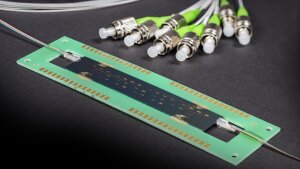
About the conference
Integrierte optische Schaltung mit Glasfaseranschlüssen
Foto: Fraunhofer IOFActive photonic circuits are experiencing rapid development and hold significant importance for the future of technology. This development is fueled by the development of active material platforms for PICs, such as LNOI or BTO which are able to combine light guidance with light creation and radio frequency modulation on the one hand and the rapidly growing demand for integrated photonic components in telecommunication, computing, and quantum technology.
This conference bring together topical leaders, which represent the entire value chain of integrated circuits ranging from fundamental researchers, technology developers, emerging foundries, to novel applications. The interdisciplinary conference topic brings together expertise in physics, engineering, materials science, and information technology, with photonics holding them all together.
The conference "Jena LIGHT – Photonic Integrated Circuits" will take place on 1-3 December 2025, hosted by the university’s LIGHT profile en and the Fraunhofer IOFExterner Link. The conference is organized jointly by both institutions and is supported by the InQuoSens Innovation Center en and the Photonics Network Thuringia OptoNetExterner Link.
